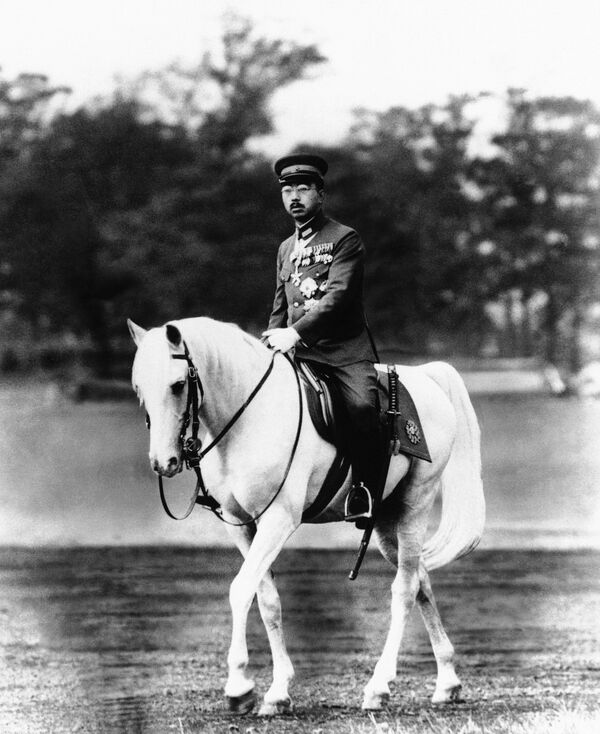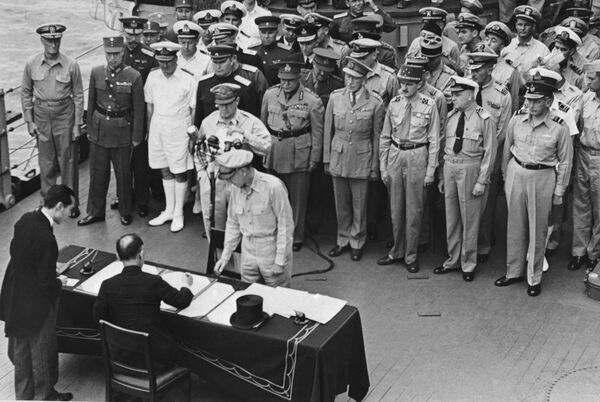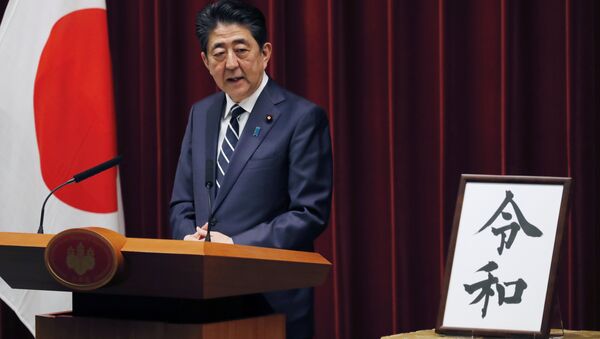On Monday, 1 April, the Imperial Household in Japan finally confirmed the name of the new era — Reiwa, meaning order and harmony.
Reiwa will begin on 1 May when Crown Prince Naruhito formally succeeds his 85-year-old father, Akihito, who has taken the highly unusual step of abdicating from the Chrysanthemum Throne because of ill health.
Akihito's reign, which began in 1989, was known as Heisei — which meant "becomes peace" — and followed on from Shōwa.
Last month Sarah Hightower, an independent researcher on Japan, said Heisei was supposed to be even better than the late Shōwa period but economic stagnation had led to a "lost generation."
\The name of the new era, “#令和 (#reiwa)”, has been announced today!/
— 🌸The Japan Foundation🌸 (@Japanfoundation) 1 April 2019
In Japan, we use one era name during each emperor’s reign, along with the Western (Gregorian) calendar. Let’s practice the kanji of the new era with us before it starts on May 1!#新元号 #令和元年 #japanese pic.twitter.com/ZfZNCMyqXo
Shōwa — which means "Japanese glory" — began in 1926 when 25-year-old Hirohito became Emperor.
Under him Japan became more and more militaristic and expanded into China before the attack on Pearl Harbor triggered war with the United States.
During the Second World War the cult of the emperor rose to fanatical levels with soldiers, sailors and airmen — including the famous kamikaze — going into battle for the honour of defending the Emperor and having their spirits enshrined at the Yasukuni shrine in Tokyo.
The Japanese empire eventually extended as far as Burma, Singapore and Indonesia.
If the head of the Nazi or fascist states in Germany or Italy had been captured alive by the Allies they would certainly have been put on trial and probably executed, but the ruler of the Japanese Empire was given very different treatment.

In 1945 after the Japanese people had heard their Emperor's voice for the first time — when he announced the nation's surrender after atomic bombs were dropped on Hiroshima and Nagasaki — the Americans decided to grant clemency.
They created a narrative which portrayed Hirohito as an innocent pawn in a cunning plan by extreme militarist nationalists like General Hideki Tojo, who was prime minister from 1941 to 1944.
The Americans, who occupied Japan after the war, failed to delve into the secrets of the Imperial Household and portrayed Hirohito as some sort of prisoner who had been held hostage by the military and was kept in the dark about atrocities such as the Nanking Massacre or the bestial treatment of allied prisoners of war or Korean "comfort women" — who were forced into becoming prostitutes for Japanese soldiers.
Here's a copy of the fax — yes, fax — that all of the national embassies received notifying them of the new era. No mention of the meaning of 'Reiwa' though… #Reiwa pic.twitter.com/2zWoXpivNR
— Jake Sturmer (@JakeSturmer) 1 April 2019
When the International Military Tribunal for the Far East began in 1946 there was little mention of the Emperor's role in the war and most of the wartime leaders who were on trial remained deeply deferential towards Hirohito and had no intention of dragging him into the proceedings, even if it meant sparing their lives.
But why did the Americans — who had suffered 111,606 deaths among US servicemen and seen another 21,000 undergo horrific treatment as prisoners of war — go to such lengths to spare the Emperor and retain him as the supreme power in Japan?
"American policy toward Japan from August 1945 was dominated by fears of the communist strategic threat to Asia. It is sometimes suggested that General Douglas MacArthur, as the Allies' supreme commander, imposed his personal will to spare Hirohito. MacArthur certainly acted autocratically, but the contemporary documentation shows that Washington's view marched with his own in rating the stabilisation of Japan above all other considerations," Max Hastings, a military expert and former newspaper editor, told the HistoryNet website.
By the time Tojo and six other wartime leaders were hanged at Sugamo prison in Tokyo in December 1948, Japan was rebuilding its shattered economy and Hirohito had become a constitutional monarch, rather than a demi-god.
Hirohito knew he had been lucky to escape with not only his life but his considerable wealth and luxurious lifestyle too.

He played the game — keeping a low profile and smiling beatifically as successive conservative governments rebuilt capitalism and became a dutiful ally of the United States during the Korean War and the Vietnam conflict.
Was communism ever really a threat?
Unlike in Korea or China there was never a military threat from communists in Japan and they posed little risk of taking over politically either.
In the 1949 general election the Japanese Communist Party, won three million votes and 35 communist MPs were elected.
A South American sea lion (Otaria) tries calligraphy of the new era name 令和 (Reiwa). pic.twitter.com/DJnLj4mmOA
— otakujp (@otakucalendarjp) 1 April 2019
But it was only the fourth biggest party and was overshadowed by the more moderate Socialist Party.
During the McCarthy era and at the height of the Cold War the JCP's chairman Kyuichi Tokuda was persecuted by the Americans and forced to go into exile in China in 1953.
His successor Sanzō Nosaka remained the JCP's leader until 1982 but despite getting around five million votes throughout the 1980s it remained a minor player as the Liberal Democratic Party (LDP) held sway.
But unlike communist parties in Europe and elsewhere the JCP has hung on doggedly and at the last general election in 2017 more than four million Japanese voted communist and it won 12 seats.




